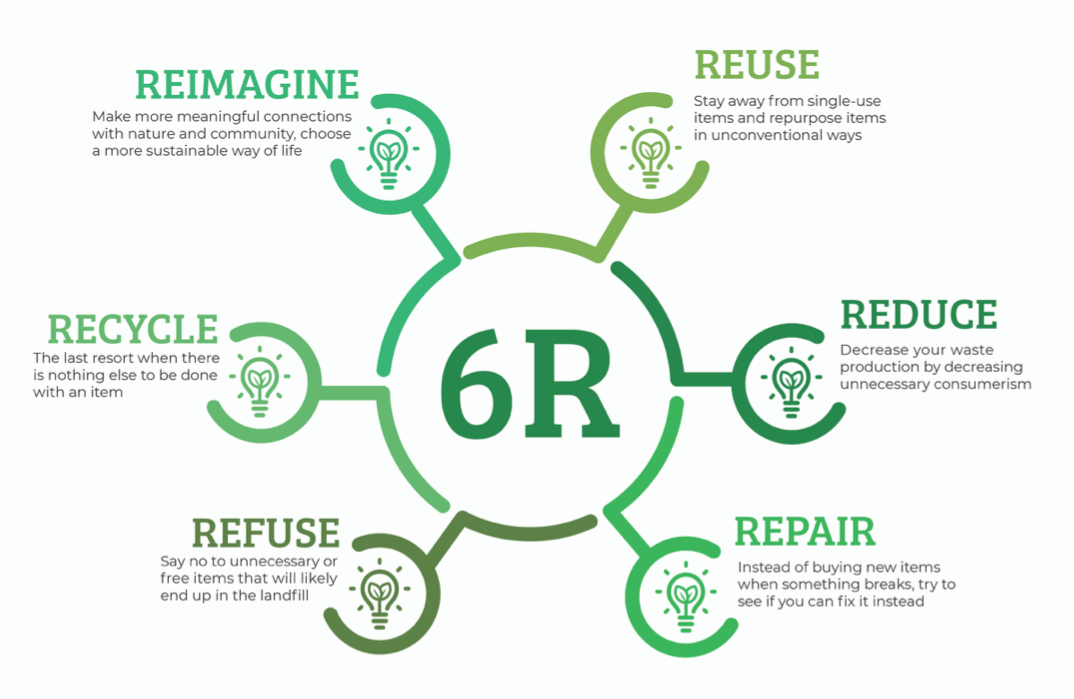When you were young, you were probably taught the "3 R's" - reduce, reuse and recycle - but, in fact, there are at least 6 R's that you need to be aware of when it comes to minimizing your waste and living in a more sustainable way. Read on to learn more about them...
1 Reuse
Stay away from single-use items where possible and repurpose items in unconventional ways. Choose reusable cups, bags, cutlery, towels and more! Deliberately buying things that are reusable to begin with is the first step in being able to easily reuse products past what they're originally intended for.
In a pinch and need to buy a jar of pasta sauce or a special ingredient you can't buy package-free? Instead of throwing the jar away, reuse it! It can be turned into a glass to drink from, a vase, container, decoration, and so much more. This idea of reusing items past their original purpose helps prevent the need of buying new items. It allows you to give items a second life in some sort of creative manner.
Here are some more examples:
Newspapers, cans → Seed starters
Food scraps → vegetable broth, compost
Old clothes → kitchen rags
Gift bags → Reuse them and gift to someone else
Old toothbrushes → clean hard to reach places or smaller areas
2 Reduce
Decrease your waste production by decreasing unnecessary consumerism. Everything you buy comes at a price, and not just a monetary one. It takes a vast amount of resources, labour, and transportation just to get the item into your home. Ultimately, most of the things we buy will end up in a landfill. Here are some questions you can ask yourself before committing to an item:
- Will I actually use this?
- Can I borrow it instead?
- Can I find a more sustainable alternative?
- Does this bring genuine value into my life?
- Do I need it?
Depending on your answers to these questions, you'll be able to come to a conclusion as to whether or not you really need said item. Unlearning consumerism is extremely challenging, but really thinking about the items can help you figure out what material objects you do and don't need in your life.
3 Repair
Instead of buying new items when something breaks, try to see if you can fix it instead. Learning to make repairs can be cost effective, and it prevents items from ending up in the landfill. Got a rip in your jacket? Learn to sew. Fan's not working? Watch a youtube video on how to fix it! Your first response to a broken item shouldn't be to immediately throw it out. Instead, ask friends or family for help, watch videos online, see if you can salvage parts, reuse it in other ways, and as a last resort, throw it out. It's also really fun and satisfying to know how to fix items!
Reimagine Co used to run repair cafés that would help people fix broken items so they wouldn't immediately go to replace them. It was a lot of fun learning how the technology we use works, saved everyone money, and brought community together to share and learn (which is the reason for Reimagine's existence).
While we're not able to run this program right now, due to the pandemic, we're looking forward to starting again once it's safe to do so. What's more, with our new Thing Library we're going to facilitate more repairing by making tools available to everyone and by sharing skills.
4 Refuse
Say no to unnecessary or free items that will likely end up in the landfill. If you've been to a conference or open day, you've likely been bombarded with free pens, highlighters, buttons, paperweights, water bottles, and things you just don't end up using. While it's difficult to say no to free items, it can be done with practice. And it feels great!
Think about all the items you've gotten for free, and how many you actually end up using versus how many you end up losing or that end up as clutter. You'll have more space and you'll feel better about your choices. Saying no is like a muscle - the more you work it out, the stronger it gets!
5 Recycle
The last resort when there is nothing else to be done with an item. Recycling is not a foolproof method. Oftentimes people "wishcycle", and they contaminate the rest of their recycling bag, which means everything ends up in the landfill.
Also, plastics can only be recycled one or two times before they are too fragile and need to be thrown into the landfill. That means that every single plastic item you use will end up in the landfill, whether you recycle it or not.
Use Recycle Coach, an excellent free app, to see what can and cannot be recycled in London or whichever municipality you in live.
6 Reimagine
Reimagine how you live your life. Make more meaningful connections with nature and community, choose a more sustainable way of living.
Our society is a consumer-based one that relies heavily on convenience over sustainability. But we can change this! Our small actions add up and make a big difference.
Reimagine's goal is also for corporations and governments to start making big changes at the top of the chain and that can only happen if we both be the change and use our voice. Together, let's reimagine what's possible.

